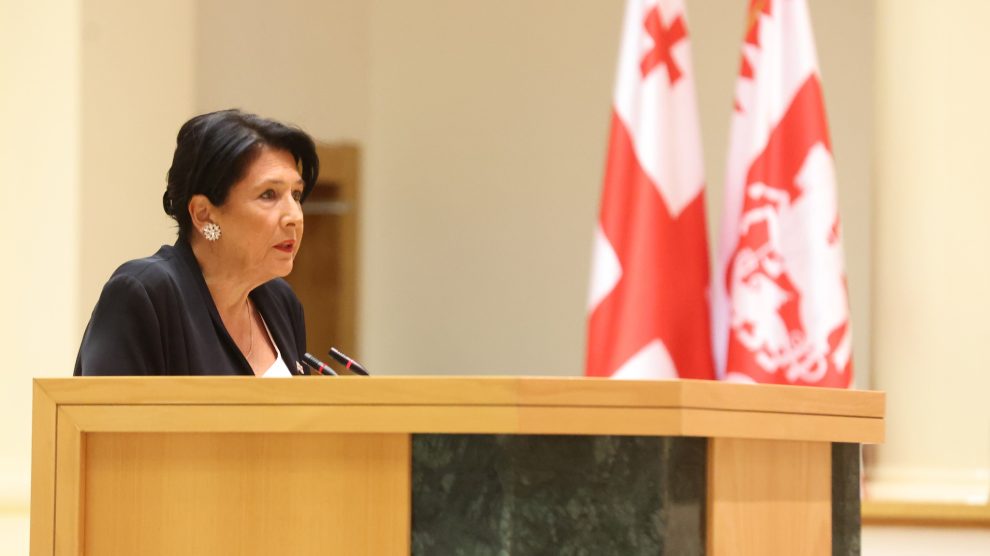Months of tension between Georgia’s ruling party and the country’s president Salome Zourabichvili came to a head in an impeachment vote on October 18. While Zourabichvili survived, divisions in Georgian society are wider than ever.
For years—though to an even greater extent since Russia’s 2022 invasion of Ukraine—Georgia has struggled to pursue the European Union and North Atlantic Treaty Organisation (NATO) membership so popular among its citizens without angering neighbouring Russia and risking the occupation of more of its territory by Moscow.
The ruling Georgian Dream party of prime minister Irakli Garibashvili applied for EU membership with Ukraine and Moldova in the immediate aftermath of Moscow’s invasion of Ukraine (although Ukraine and Moldova were granted ‘candidate’ status, Georgia was given a list of requisite reforms instead).
- Growth in Georgia a catalyst for flourishing cultural sector
- Armenia, Georgia, and Tajikistan remain the top growth performers in emerging Europe and Central Asia
- Why Armenia will have a hard time mobilising the international community in its latest standoff with Azerbaijan
Garibashvili has also publicly courted China—elevating bilateral relations to a ‘strategic partnership’—and Russia—resulting in Moscow removing visa requirements for Georgians and the restoration of direct flights between Georgia and Russia.
Some analysts believed the so-called ‘foreign agent’ bill—backed by Georgian Dream and its allies but criticised by EU leaders and withdrawn after mass protests—was an attempt to deliberately sabotage the EU accession process to preserve Russian perceptions of Georgia’s neutrality while ensuring the decision came from Brussels to lessen political backlash from pro-EU Georgians.
Georgia’s president, Salome Zourabichvili, ran as an independent candidate backed by Georgian Dream in 2018 but has emerged as a staunch critic of the “anti-Western” policies of Garibashvili’s government that “estrange us from Europe”.
While Garibashvili and Zourabichvili’s differences of opinion contribute to an image of Georgia as an unsettled geopolitical battleground that is beneficial as both seek concessions from international partners, their disagreements have grown increasingly public and unsustainable.
Unauthorised EU visits
As president, Zourabichvili is required to obtain the permission of the prime minister’s office before conducting state visits. However, after the Georgian government denied her permission to make a number of visits to Ukraine and several EU capitals, Zourabichvili held meetings in Berlin and Brussels in August and September.
She claimed that her visits were made in a private capacity but were intended to boost Georgia’s chances of receiving candidate status. European Council President Charles Michel tweeted that he welcomed Zourabichvili’s commitment to advancing Georgia on its EU path and said that she had the EU’s full support after they met on one of her visits.
On September 1, the Georgian Dream chair, Irakli Kobakhidze, announced the government would initiate impeachment proceedings against the president, saying, “The President of Georgia, Salome Zourabichvili, grossly violated the constitution of Georgia and started a series of visits to foreign countries without the government’s consent. According to the constitution of Georgia, only the government of Georgia is authorised to implement both domestic and foreign policy of the country.”
“Turning a blind eye to gross violations of the constitution undermines the rule of law and the democratic constitutional system, which we cannot allow,” he added, and accused Zourabichvili of endangering the country’s EU accession.
A failed vote
On October 16, Georgia’s Constitutional Court found Zourabichvili’s unauthorised visits had made her guilty of violating the constitution, paving the way for a parliamentary vote on impeachment.
“I will not be deprived of anything by this process,” said Zourabichvili at the October 18 parliamentary session on her impeachment. “Today, not my fate, but your fate is decided. You are not impeaching me, but yourself, the country, its European future, and every one of your votes [in favour of impeachment] is a vote against this future of ours.”
Removal from office requires the support of two-thirds—that is, 100—of the 150 members of parliament. The vote on impeachment failed, with 86 votes in favour of impeachment and one against. The remainder of the chamber boycotted the session or refused to vote.
“If Salome Zourabichvili had retained her basic dignity, she would have resigned,” said Kobakhidze. “She will remain exclusively the president of the [opposition United] National Movement; what is the value of the presidency in such conditions? Judge for yourself.”
While Zourabichvili will undoubtedly try to continue promoting Georgia’s EU candidacy, her ability to credibly and legitimately speak on behalf of the country has taken a serious hit.
Amid the impeachment, Georgian Dream rushed through a controversial amendment outlawing media from broadcasting ‘obscenity’, defined as “an action which is in conflict with ethical norms established in society and which has no social and political, cultural, educational or scientific value.”
One of the requisite reforms for Georgia’s EU candidacy is strengthening media freedom.
While any final blow has yet to come, it is doubtful that Brussels views the current political turmoil and tightening of media freedom with favour.
Photo: Salome Zourabichvili (official Facebook page).
Unlike many news and information platforms, Emerging Europe is free to read, and always will be. There is no paywall here. We are independent, not affiliated with nor representing any political party or business organisation. We want the very best for emerging Europe, nothing more, nothing less. Your support will help us continue to spread the word about this amazing region.
You can contribute here. Thank you.







Add Comment